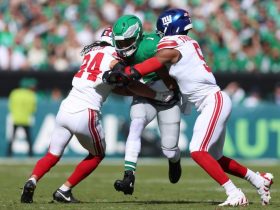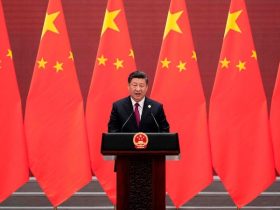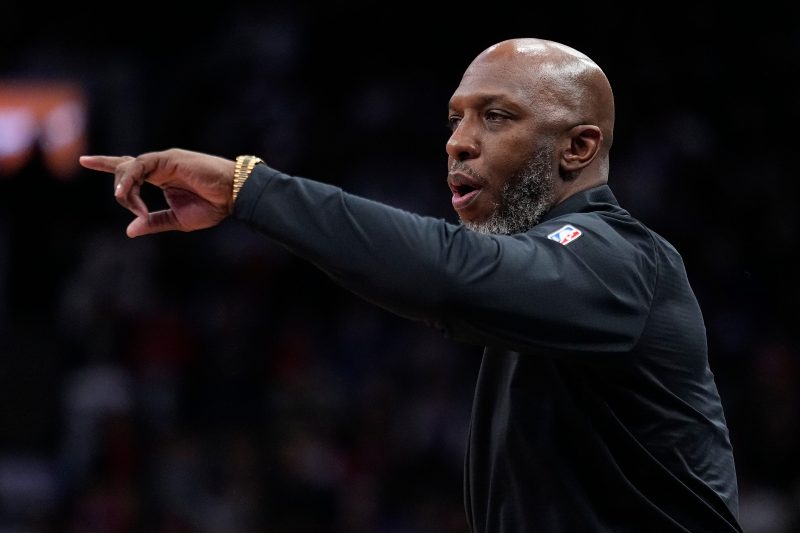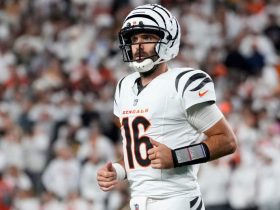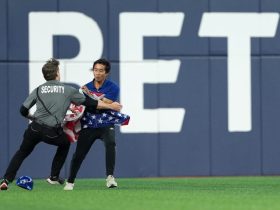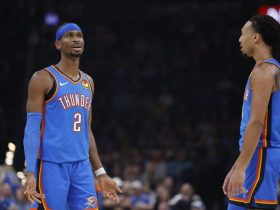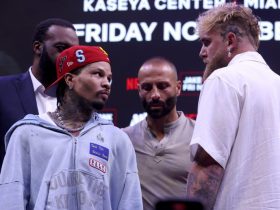Former NBA star and current Trail Blazers coach Chauncey Billups was arrested in connection with an illegal poker scheme.
Prosecutors allege Billups was recruited to lure wealthy victims into rigged games, though it is unclear if he knew of any mafia ties.
Court documents suggest Billups was an active participant, using signals to cheat and receiving a $50,000 wire transfer.
Billups was arraigned on charges of wire fraud and money laundering and has been placed on unpaid leave by the NBA.
A five-time All-Star and three-time All-NBA selection, Billups laced so many clutch baskets in his day that people took to calling him ‘Mr. Big Shot.’ In 2021, he became the head coach of the Portland Trail Blazers, overseeing a team that had started to show modest improvement in recent seasons.
So how would a person like Billups — an NBA champion and Hall of Famer whose career earnings exceeded $105 million — become implicated in an illegal poker scandal? And at that, a scheme with ties to the mafia, one that swindled at least $7.15 million from unsuspecting victims?
According to prosecutors and experts in organized crime, it all starts with influence and recruitment.
Yet, despite the explosive revelation that the Bonanno, Gambino and Genovese crime families allegedly offered protection at rigged poker games in New York, a close reading of the indictment and detention letter shows it’s unclear whether Billups was aware of any alleged connection whatsoever to the mafia.
According to those documents, Billups participated in at least two poker games: one around April 2019 in Las Vegas, and another in late October 2020, at an undisclosed location.
Court documents are careful to specify only that the mafia “backed games in the New York area,” taking a cut for security and collecting “owed debts from the games.”
Furthermore, none of the indicted persons named alongside Billups at the April 2019 game in Las Vegas are listed as members or associates of any of the three New York families.
There is no reference in either document of any other organized crime family offering similar protection for the Las Vegas game to which Billups is allegedly linked. This does not necessarily mean such an arrangement did not exist, only that it is not outlined in the documents.
To that end, professor Federico Varese, a senior research fellow at Nuffield College at the University of Oxford and author of ‘Mafia Life,’ believes an operation like the one outlined in the indictment required protection at any location where games were taking place.
“To me, it’s fascinating because there is a very clear division of labor,” Varese told USA TODAY Sports. “Everybody had a job. That comes out so clearly — it’s almost like a textbook case of the mafia back to doing what they do best, which is protection, enforcement, settling disputes.
“This is classic stuff out of the 1930s and ’50s. They still have this ability to control, to use violence and instill fear — sometimes only on the power of their reputation.”
All of this, however, does not answer how Billups allegedly became ensnared in the scheme, and the other — perhaps the most pressing — key question.
‘He was star struck!’
Billups was arraigned Oct. 23 in Portland on charges of wire fraud and money laundering, and the NBA placed him on immediate, unpaid leave.
Prosecutors allege that he was part of a team of poker players who cheated through the use of a rigged shuffling machine and a system in which signals were relayed to “Face Cards,” or players in on the alleged operation.
“Why, of all people, Chauncey Billups?” Dr. Jay Albanese, a criminology professor at Virginia Commonwealth University, told USA TODAY Sports. “You might expect this of a young player who is out of control or someone who had a bunch of hangers-on.
“There are some people I would’ve guessed to put on the list, but Billups was not on mine. So that, I think, is the hanging question right now.”
Details concerning the origin of Billups’ alleged involvement remain unclear. What court documents are unequivocal about, however, is that it was Robert L. Stroud, a 67-year-old man from Louisville, who allegedly brought him and fellow former NBA player Damon Jones into the operation.
“The bottom line,” Martens said, “is poker players and gamblers love to be around stars.”
Prosecutors share this opinion. The detention letter outlines the April 2019 Las Vegas game and includes text messages between Stroud and Sophia Wei, another defendant. Prosecutors said the texts occurred during the rigged games and discussed things such as the draw that Billups had as a Hall of Famer.
“The one guy on the end acted like he wanted Chauncey to have his money!” Stroud wrote in one of the texts, per the detention letter. “He was star struck!”
This, prosecutors allege, is what funneled Billups and Jones toward the scheme.
“Stroud recruited former professional athletes, including defendants Billups and Jones, into the conspiracy to lure wealthy victims into playing in the games,” the letter said. “For their role as ‘Face Cards’ and members of the cheating teams, Stroud paid them a portion of the criminal proceeds.”
The letter goes on to allege that, following the October 2020 game at the undisclosed location, Stroud wired $50,000 to Wei through his company, Lil Robbie Productions LLC; later, Wei wired $50,000 directly to Billups.
In another series of texts, Stroud and Wei discuss the need to intentionally lose certain hands to avoid suspicion of cheating after Billups and another alleged defendant “hit 2 gutshot on the river against the same guy.” Per the messages, both hands were for a pot of at least $30,000.
To remain undetected, Wei suggested putting another player in on the scam at the table so that Billups and other “Face Cards” could purposefully lose to the new player, thus deflecting suspicion.
“Sounds like a plan,” Stroud responded, per the letter.
“Ok perfect,” Wei concluded. “They already know all the signals … just gotta let us know which one.”
This exchange strongly suggests that prosecutors believe Billups was not a passive participant in the alleged scheme, but rather willing to use the signals, actively defrauding unsuspecting victims.
What remains unclear is how much Billups may have known about the top levels of the alleged scheme. The key in answering that appears to be the nature of Billups’ relationship to Stroud, who is also accused of organizing rigged poker games in New York, under the supervision of the mafia.
“There has to be some motive there,” Albanese said. “How was Stroud or whoever it was able to recruit him? What was the hook? Maybe you can get him to tell you.”
USA TODAY Sports sent a list of questions to Chris Heywood, an attorney representing Billups, asking about the nature and origin of Billups’ alleged relationship to Stroud and whether Billups had any awareness about potential links to organized crime in the alleged scheme. Heywood did not respond.
In a statement issued to ESPN on Oct. 23, Heywood called Billups a “man of integrity” and spoke of Billups’ legacy, reputation and freedom.
“He would not jeopardize those things for anything, let alone a card game,” Heywood said.
According to WAVE News in Louisville, police said Stroud was gambling and playing cards at a home in Louisville in March 1994, when he shot a man through a door, killing him. WAVE also reported that Stroud was pulled over in 2001 for expired tags when police found “sports betting cards, dice, playing cards and what appeared to be gambling records” in his car.
Aside from allegedly organizing the rigged games, Stroud is also accused of supplying much of the technology used to cheat and committing a gunpoint robbery to steal a rigged card shuffling machine.
USA TODAY Sports also sent a list of questions to Patrick J. Renn, an attorney representing Stroud, asking about the nature and origin of Stroud’s relationship to Billups. Renn also did not respond.
The final mystery, assuming Billups did knowingly become involved in the scheme, is what — other than money — may have lured him in.
None of the experts interviewed for this story wanted to speculate conclusively, but possible explanations included an undisclosed financial hardship, extortion, a thrill for risk, a desire to return to a competitive arena in retirement, or that he may have been misled about the severity of the alleged operation.
So what options does Chauncey Billups have?
Billups is scheduled to appear in court Nov. 24 in Brooklyn. He was required to turn in his passport and is prohibited from gambling or contacting other defendants.
Each of the experts interviewed for this story presumed that defendants will start to flip in pursuit of plea bargains, seeking immunity or more lenient sentencing.
Due to the allegations against Billups being nonviolent, and due to his clean criminal record, each expert suggested that Billups should strongly consider a plea bargain.
In January 2000, Billups did settle a civil suit for an undisclosed amount, stemming from a 1997 incident in which a woman said that Billups and his former teammate, Ron Mercer, raped her. Criminal charges were never filed, but police reports stated that a rape kit examination of the victim showed injuries consistent with sexual assault.
The alternative, if Billups felt he could prove his innocence in this case, would be to fight the accusations in court, though that carries significant risk. This is only magnified further because attorneys representing Billups and the other defendants do not know, at this point, what evidence investigators may have.
The prevailing sentiment from experts was that if federal investigators made a big show of bringing the case in, they presumably feel confident about winning convictions.
“It would be very embarrassing for prosecution if they would get off,” Varese said. “If you go after a very important person with a high standing in the community, and you put them through the system, you don’t want to look like you made a mistake.”


